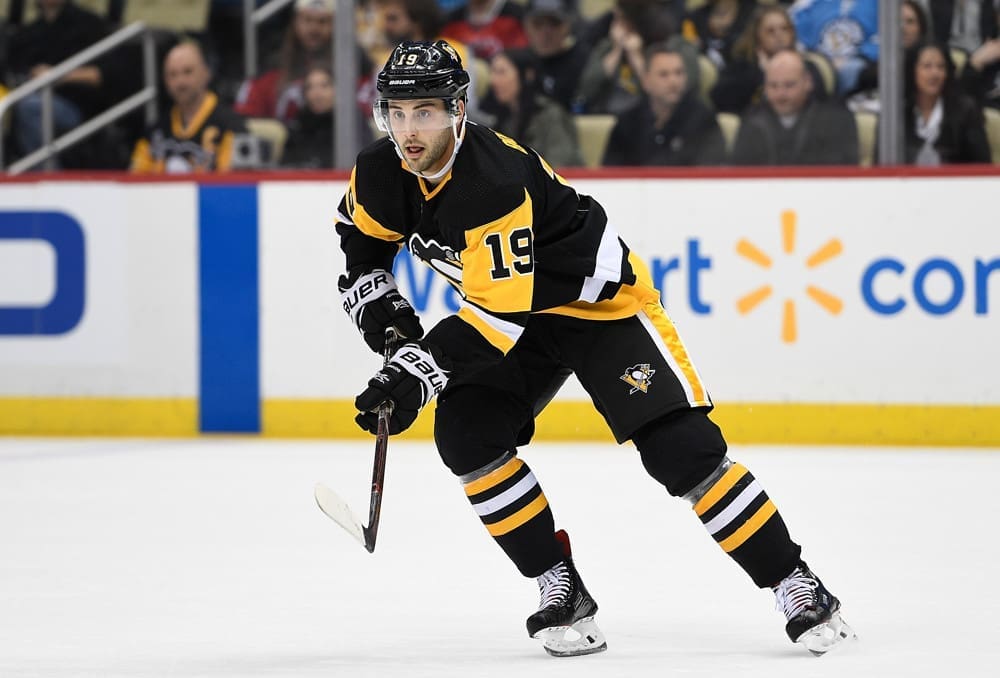Penguins
‘Go, Go, Go’: Brassard on Fast-Paced Pens, Feeling Cup Pressure
Of all the players who were traded this year, Derick Brassard probably has the biggest on-ice adjustment.

CRANBERRY TOWNSHIP, Pa. — Of all the players who changed teams before Monday’s NHL trade deadline, Derick Brassard probably has the biggest on-ice adjustment to make.
In less than a week he goes from Guy Boucher‘s passive 1-3-1 forecheck and defense-first mentality in Ottawa to the pedal-to-the-metal Penguins, who didn’t exactly invent the league’s speed revolution, but have nonetheless milked it for all it’s worth over the past two seasons.
“It’s gonna take a few games,” Brassard told reporters after his first full practice with the Penguins, Wednesday afternoon at the Lemieux Sports Complex. “I don’t put a timeline to it. Just looking forward to tomorrow and playing another game. Having practice with the guys helped make me feel more comfortable out there. We have to have a feel for each other. Eventually it’s gonna come.”
Both Patric Hörnqvist and Olli Määttä noted Brassard’s astute hockey brain as one of his better attributes, so perhaps the 30-year-old former Senator, Ranger and Blue Jacket is in a good position to pick things up in rapid fashion. Thursday’s game in Boston will provide another opportunity to settle into a system that, more than most, requires all members to be on the same aggressive page.
Then again, Brassard went through a similarly drastic process when the high-tempo Rangers dealt him to Ottawa two summers ago. That’s when Boucher took over the Senators and effectively put the clamps on them.
“We played a really unique style there,” Brassard said. “It took me a while to get adjusted to it. The whole team, too.”
Pressed for details by Pittsburgh Hockey Now, Brassard elaborated on how it felt to be encouraged to take more chances during Tuesday’s 3-2 loss to New Jersey at PPG Paints Arena.
“In Ottawa, we kept it really simple,” he said. “We always had numbers back. I feel like for me personally, yesterday was an adjustment. It’s more like a ‘Go, go go’ team and ‘Pressure, pressure’ and ‘Make plays’ and everything, not sitting back and waiting for mistakes.”
Brassard allowed that he was “100 percent” inclined to be more creative offensively Tuesday than he was with Ottawa, simply because of the Penguins’ offensive reputation over the years. Hey, he’s played against them enough times to know what they’ve been about.
He said it got to the point that he had to remind himself of what the coaching staff told him before faceoff with the Devils. Despite being one of the bigger trade-season splashes, Brassard doesn’t need to go outside himself to lift the Penguins’ level.
As former Penguins honorary captain Fred Rogers would’ve put it, they like Brassard just the way he is, even if it’s natural for Brassard to feel like the missing piece in a three-peat puzzle.
“Like they told me, I’m not here to save anyone,” Brassard said. “They’re already proven in the past. I’m just here to help out. I just have to go out there and have fun and enjoy the moment. I’m not going to put any more pressure on myself, but the last couple of days I was pretty excited.”
Mike Sullivan conducted a video meeting before Wednesday’s practice, going over the ways they’ve lost some of their fundamentals over the past two games. The Penguins have dropped back-to-back games in regulation for the first time since December.
Sounds like some of that Sullivan-led messaging is getting through to Brassard already.
“I thought our first period was OK yesterday, but second period we gave up too much on the rush,” Brassard said. “If we can play better defensively, we have a better chance to score some goals.”
That doesn’t mean the Penguins want Brassard to be focused on being responsible in his own zone first. He’s not a typical third-line center, especially if he continues to play with Phil Kessel as he did in his black-and-gold debut.
As Määttä put it to me, Brassard’s strengths are in the playmaking category, with his decision-making rivaling his feet in terms of velocity.
“He doesn’t need a lot of time to make plays because he’s so quick with the puck,” Määttä said, recalling previous matchups with Brassard over the past five years. “He knows what’s happening before he gets the puck. He knows where to go with it. That’s what makes him difficult to defend.”
How the details such as linemates and responsibilities play out will be important, no doubt, but the main takeaway for Brassard should probably be that he’s in a much better position to succeed under Sullivan than he was laboring for Boucher.
“We want them to act on their instincts and trust their instincts,” Sullivan said. “That’s when players are at their best.”












